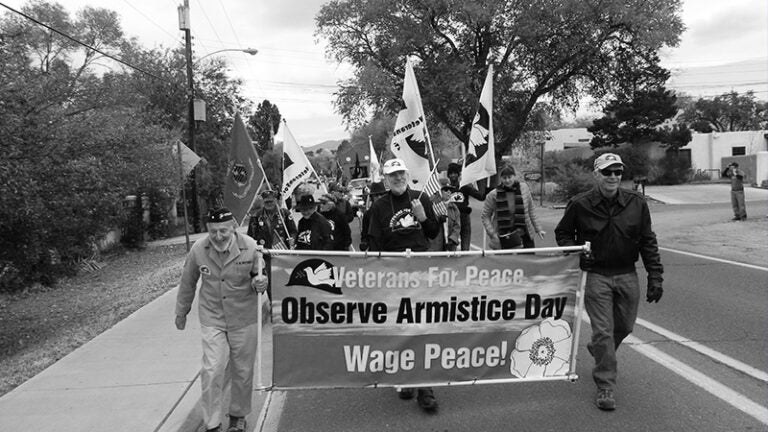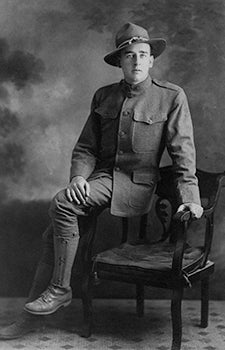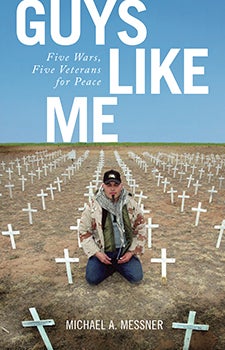
The true meaning of Armistice Day — a commitment to peace
It’s 2003, and World War II veteran Ernie Sanchez is watching the American-led invasion of Iraq on television when he suddenly starts shaking and sobbing uncontrollably. Later, through therapy, he learns that what he experienced is PTSD (post-traumatic stress disorder) and that his symptoms reveal his deeply repressed memories of having killed between 50 and 100 Germans during the war. As part of his healing, he now speaks of those dead Germans as sons and brothers, people who were loved by their families, thereby humanizing them.
This moving anecdote is one of many contained in Guys Like Me: Five Wars, Five Veterans for Peace (Rutgers University Press, 2018) by Michael Messner, professor of sociology and gender studies at USC Dornsife. Published to coincide with the centennial of Armistice Day on November 11, the book tells the stories of five veterans from World War II through the Iraq War. All have dealt with the trauma of war and all have become lifelong peace advocates.

Michael Messner’s grandfather, Private Russell Messner, pictured here in 1918. Photo courtesy of Michael Messner.
Their stories contain their paths to reconciliation with former enemies and to their own personal healing from trauma and from what Messner calls “the deep moral injury” they carry from having killed other people, sometimes in great numbers.
Their life stories are bookended by a prologue focusing on Messner’s grandfather, Russell Messner, a proud World War I vet, and a final vignette from Santa Fe, New Mexico, where members of Veterans for Peace march in a Veterans Day parade behind a banner reading “Observe Armistice Day; Wage Peace.”
A commitment to peace
Michael Messner’s writing of Guys Like Me was triggered by his grandfather’s unexpected reaction when Messner wished him “Happy Veterans Day,” 35 years ago.
“It’s not Veterans Day, it’s Armistice Day,” his grandfather angrily retorted. “Those damn politicians went and changed it to Veterans Day so that they could keep having more wars.”
Armistice Day — the commemoration of the truce that brought the end of WWI — became Veterans Day in 1954 in the aftermath of WWII and the Korean War. The reason, said President Dwight Eisenhower at the time, was to honor veterans of all wars, not just WWI.
“But to my grandfather and other World War I vets, that change symbolized for them a betrayal of what they felt was the promise of Armistice Day — not just the end of their war, but the end of all wars, and a commitment to peace,” Messner said. He elaborated on this in a recent article published in The Conversation.
It wasn’t until many years after his grandfather’s angry outburst that Messner realized that his grandfather wasn’t unique: Many veterans of World War I and other wars were, and are, staunch advocates for peace.
Meetings with members of organizations like Vietnam Veterans Against the War, Veterans for Peace and About Face: Veterans Against the War spurred Messner to focus his research on their experiences.
“One of the reasons I wrote Guys Like Me was because I wanted to make these veterans’ voices and stories more visible to the American public,” he said. “I think this is a particularly important time for their voices to be heard, especially in light of our government’s efforts to radically increase our already huge military budget, as they continue drone warfare and military occupations in Afghanistan and elsewhere.”
The road to finding that voice and being able to discuss their trauma is often long and hard for war veterans, Messner notes. Many have to fight their way through societal expectations that men should deal with pain and traumatic experiences by maintaining a manly silence. Therapy helps some to open up — but for others it takes a failed suicide attempt.
Those who do find their voice often engage in helping other vets — a service to others, Messner says, that meshes with that personal healing and also with advocacy for peace.
Guys Like Me
Russell Messner also unwittingly supplied the book’s title: Michael Messner remembers his grandfather saying, “Guys like me get sent to war. It’s not those politicians who are fighting the wars.”

Michael Messner tells the stories of five veterans who are all peace advocates.
An echo of his grandfather’s words can be found in the book’s final chapter where Messner describes an encounter at the weekly peace vigil in Santa Fe between a young man who thanks a group of older Veterans for Peace members for their service.
“An 81-year-old former Marine responds, saying, ‘You thanked us for our service. That was very nice of you. But you should know that the things we did when we were in the military, we did because we were told to. This work that we are doing right now — working for peace — this is our service.’”
While Messner says some might view them as weak, or as advocating weakness, he has found veterans who are peace activists to be among the strongest people he has ever met.
“They’re exhibiting a certain type of bravery that to me is exemplary and I think serves as an example of a redefinition of strength, that we can be strong in advocating for justice, peace and a world where nations treat each other as equals,” he said. “To me, that’s a new form of heroism.”